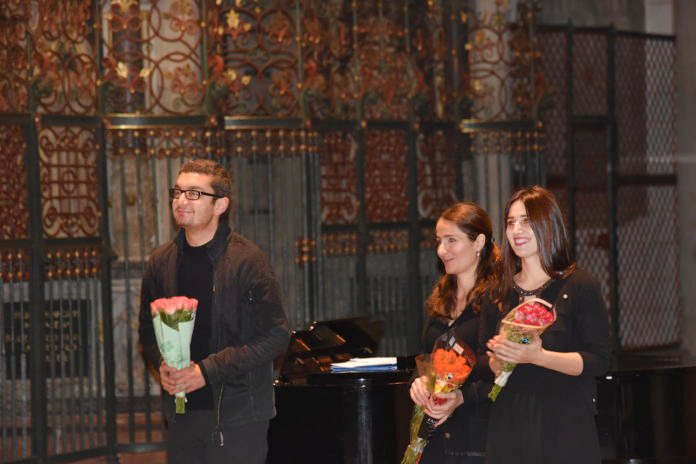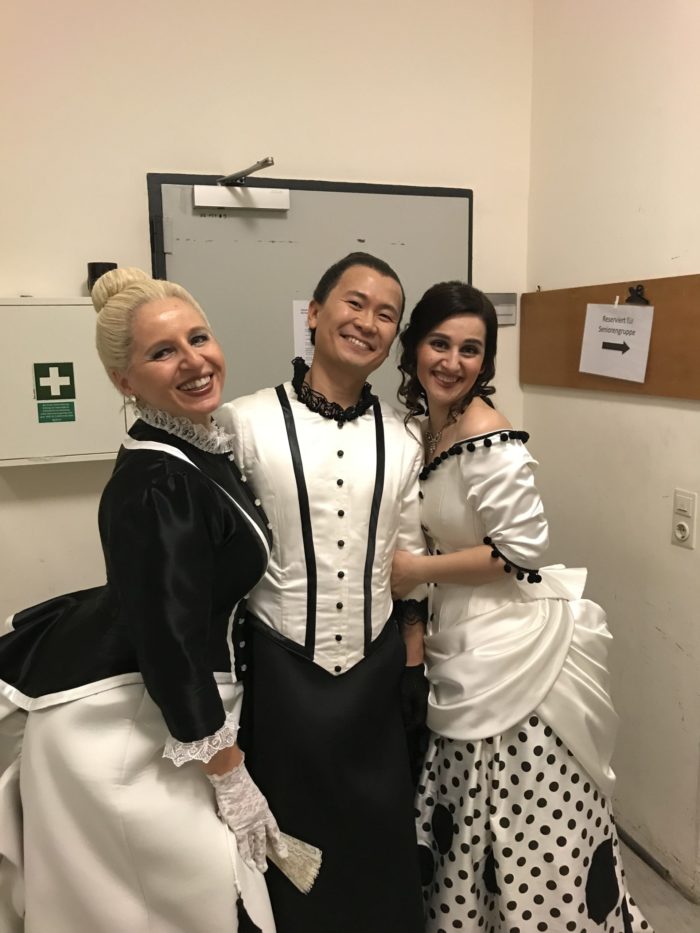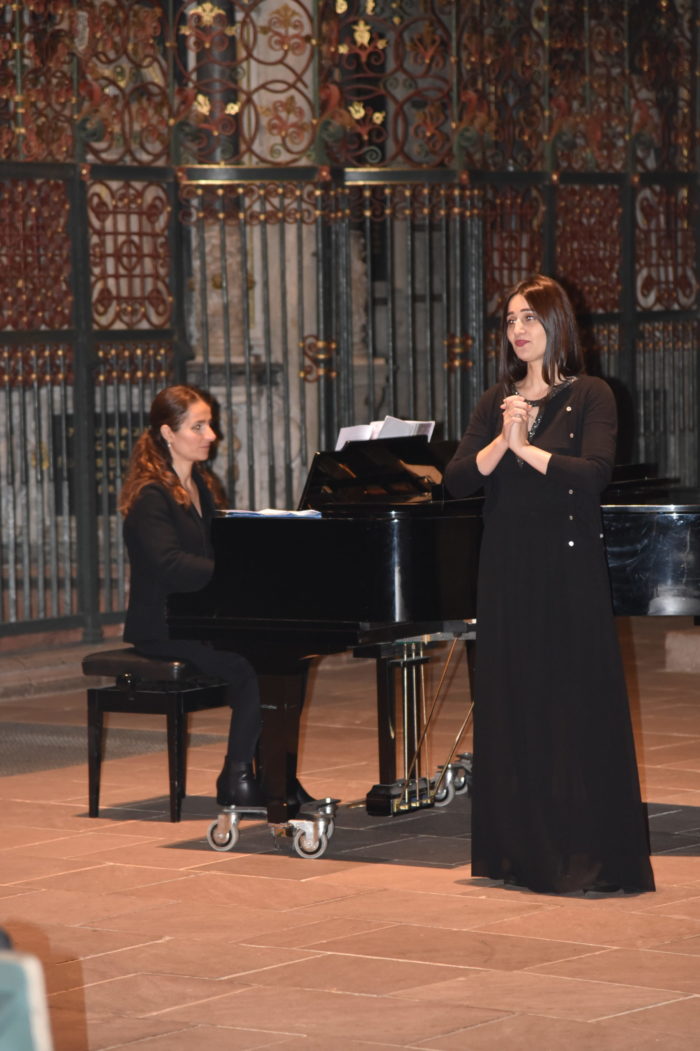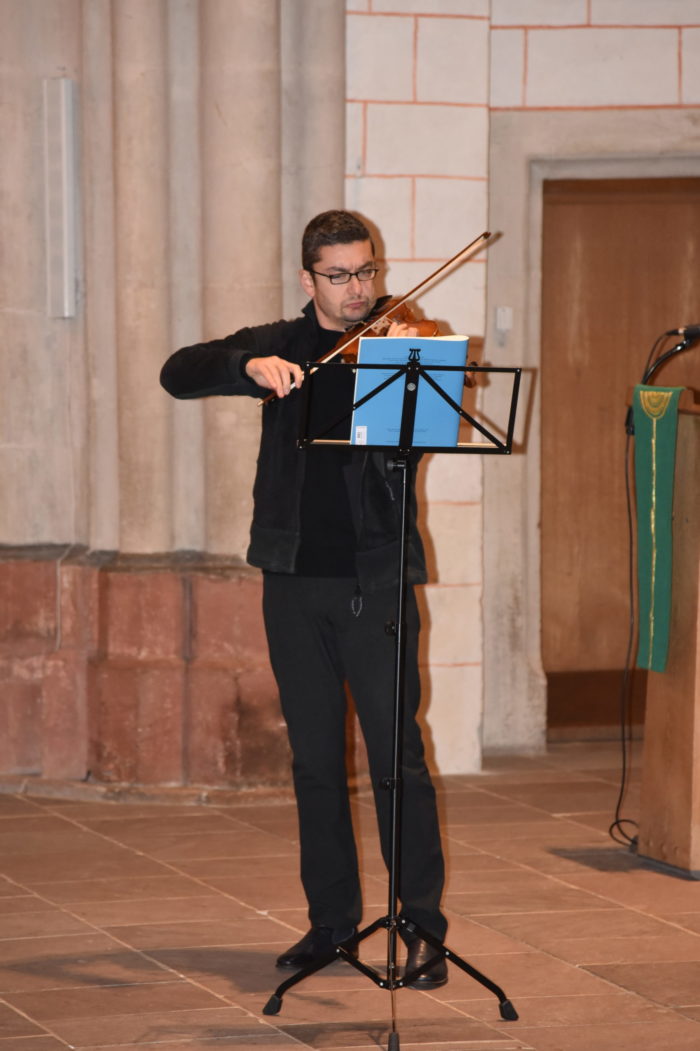
Ruben Gulkanyan, Amalia Safaryan and Seda Nahapetyan
Musicians in Germany Raise Funds for Artsakh
by Muriel Mirak-Weissbach
FEBRUARY 11, 2021 – It was in the middle of October, not long after the outbreak of the war in Nagorno-Karabakh. Amalia Safaryan, a young pianist living in Marburg, called her friend, Seda Nahapetyan, a singer in Giessen. Her message was urgent: “We have to do something; we’ll go crazy if we just sit around waiting for the war to end. We have to do something for our country!”
Her idea was to organize a benefit concert and Seda was all ears. Amalia knew a woman in Marburg with connections, who might be able to arrange something in a church. Seda contacted her friend Ruben Gulkanyan, a violinist, and he agreed instantly. Of course, any Armenian would be happy to be able to contribute something to the country. Seda travelled twice to Marburg to rehearse with Amalia, and that was it.

Backstage-Die Fledermaus. Seda Nahapetyan (right)
Luckily, the St. Mary’s Lutheran parish church was free on October 23. It was a stroke of luck, because the next available date was November 13, and by that time the new COVID lockdown would have come into effect. No one knew the lockdown would begin on November 2, but the musicians decided to move quickly, unsure of what conditions would prevail on the later date. And they knew that Armenia needed funds.
Their aim was to bring the joy of music to an audience and raise funds for Armenia. “It was all very spontaneous,ˮ Seda said, “perhaps not perfectly organized, but very moving. ˮ
She put together a program that she thought would “move the soul of any Armenian, and I think it worked.ˮ

Seda Nahapetyan accompanied by Amalia Safaryan
Everyone in the audience listened with nostalgia for the homeland. Seda sang nine songs by Komitas, which most Armenians know and can sing along. She opened, however, with Ave Maria and presented an aria from Puccini’s “La Bohemeˮ as an encore. Amalia, who accompanied her on the piano, also performed three solos, a piece by Babajanyan and two folk dances. And Ruben played works by Komitas (Krunk), Bach and Massenet on the violin.
About a hundred people turned out for the event, most of them Armenians. In observance of the public health measures, they sat at a safe social distance from one another, and wore facemasks. Their applause was enthusiastic, and their response was generous. Two thousand euros (well over $2,000) in donations were transferred later the same day to an Armenian foundation, Himnadram, the Hayastan All-Armenian Fund, to support victims of the war.

Ruben Gulkanyan
The three Armenians who organized the concert are all active members on the German music scene. Pianist Safaryan, a mother of four children, completed her studies in Armenia at the Yerevan Conservatory and is a music teacher in Marburg. Violinist Gulkanyan also began his music education in his country of origin, and graduated from Yerevan Conservatory before coming to Germany where he studied at the Nürnberg Academy of Music. He now plays as a member of the Giessen Theater.
Singer Nahapetyan comes from Armash in the Ararat province. She began her musical training at the age of 7, when her mother, a very musical woman who always dreamed of playing the piano, took her to a music school to learn to play the instrument. Throughout her school years, she continued parallel lessons at the music school, but in her final year decided to switch to singing. At 17, she entered the Yerevan Conservatory and later came to Germany where she continued individual instruction with teachers in Dresden and Freiburg. She has sung with the chorus in Verdi’s “Jerusalem,ˮ at the Freiburg Theater, and in Johann Strauss’s operetta “Die Fledermaus.ˮ The premiere took place on October 31, and further performances will be scheduled after the lockdown.